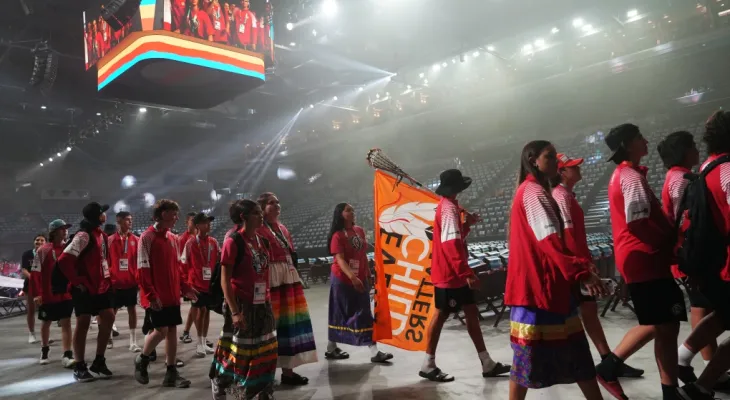Search here
Newspaper
Search here

Arab Canada News
News

Published: July 17, 2023
The North American Indigenous Games officially kicked off on Sunday evening with the presence of Prime Minister Justin Trudeau, as thousands of Indigenous athletes from across the continent filled the main hockey rink in Halifax.
The Prime Minister, who was met with cheers and some boos, said, "The stadium full of young athletes will not only celebrate their sporting achievements, but also their identity, culture, and future as Indigenous leaders over the next week."
Trudeau added, "You are here, strong young Indigenous leaders, as heirs of the legacy of colonization, assimilation, and policies in Canada and the United States that tried to erase your language, erase your culture, erase your identities, yet you are still here and still strong."
Trudeau said, "It is important for his government to help fund the games because they promote reconciliation with Indigenous peoples and help Indigenous youth connect with each other."
The Prime Minister added, "You know the legacy of residential schools, I have lived it and you are moving forward to reclaim that identity, speak your language, celebrate your cultures, understand your traditions, and be the strong leaders today and tomorrow that this country and this world needs."
The 2023 Games will blend Indigenous culture and sporting events, bringing together approximately 5,000 athletes, coaches, and mission staff from 750 First Nations across the continent.
Competitors from Ontario and Alberta led the athletes' procession to the hockey rink where the stadium gradually filled with young people waving flags and holding signs representing their regions, with athletes coming from many states and provinces including British Columbia, California, and Colorado.
12-year-old Addison Hoyle from Treaty 6 Cree territory in northern Alberta said she was excited to be in Halifax, where she will watch her brother compete in golf events, adding as the athletes' procession approached, "It's amazing to see my people everywhere here."
Norman Silliboy, Grand Chief of the Mi’kmaq Grand Council, delivered an opening speech to the gathered athletes and officially opened the games, saying, "As Indigenous people in Canada, our way of life has been consistently attacked and affected since settlers arrived over 500 years ago, and ultimately replaced by foreign forces."
Silliboy continued, "The vision was to unite the Mi’kmaq again, to see all the Indigenous brothers and sisters here today working together, and I believe we have a path to healing and hope that all Indigenous communities will someday be restored."
Near the end of the celebrations, Jane Meader, Mi’kmaq Elder, spoke to thousands of youths about the significance of water to her people's culture and to all peoples, and while women poured water from 13 Mi’kmaq communities into a copper vessel, she explained each type of water cherished by her First Nation: saltwater of the ocean; saltwater of the ocean; saltwater of the oceans, freshwater for drinking and cooking; rainfall from the sky that comes to us, and "fresh water" that comes from trees.
She said amid warm applause from the athletes that "the last water" is the amniotic fluid that carries children when they are in their mothers' bodies, while we pray over this water, my daughter will sing the song to thank the Creator for all we have received and all we have been given, remember, respect that water, respect that water, without this water, we cease to exist.
In interviews over the weekend, Games President George (Tex) Marshall said the aim is to broadcast all 21 Indigenous traditions, and said that celebrations such as smudging, where sacred smoke is provided to participants, will be available to athletes, coaches, and volunteers.
Additionally, Elders will be on site to offer guidance and comfort, and signs will be in the Mi’kmaq language, alongside English and French.
The events include traditional Indigenous sports such as canoe/kayak, archery, and lacrosse box, as well as soccer, softball, swimming, volleyball, wrestling, beach volleyball, rifle shooting, athletics, badminton, baseball, and basketball.
Comments